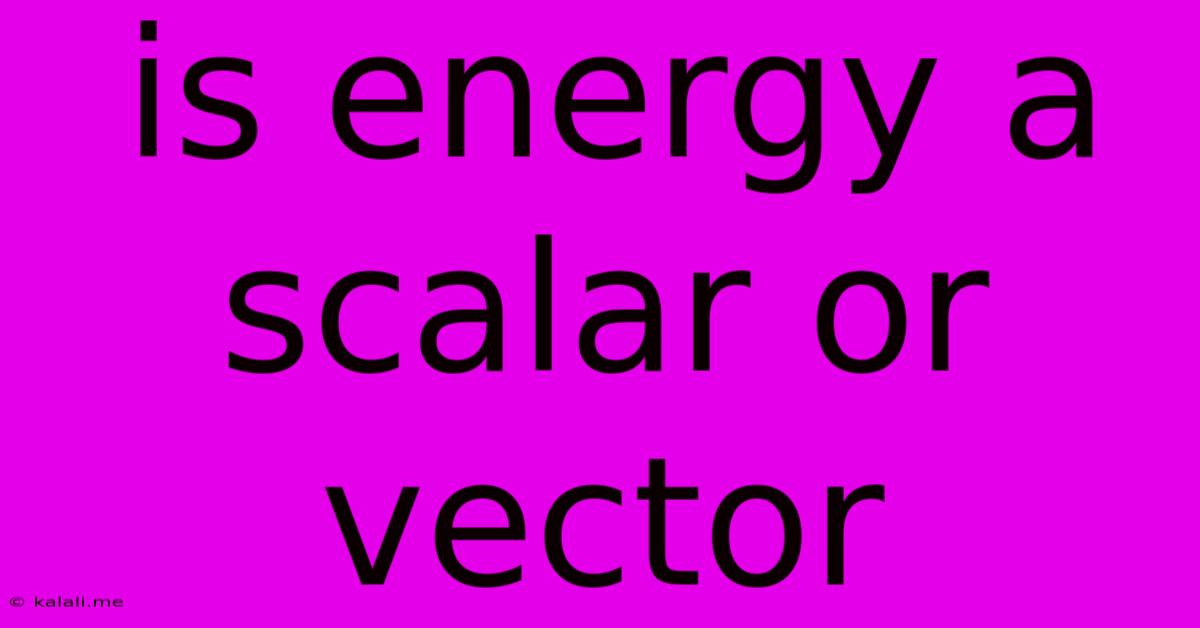Is Energy A Scalar Or Vector
Kalali
May 19, 2025 · 2 min read

Table of Contents
Is Energy a Scalar or a Vector Quantity?
Meta Description: Understanding whether energy is a scalar or vector quantity is crucial in physics. This article delves into the nature of energy, exploring its properties and definitively answering this question. Learn about the difference between scalar and vector quantities and how energy fits into the picture.
Energy, a fundamental concept in physics, is often a source of confusion when classifying it as either a scalar or a vector quantity. This article aims to clarify this misconception and provide a definitive answer. But first, let's briefly review the definitions of scalar and vector quantities.
Scalar vs. Vector Quantities
A scalar quantity is a physical quantity that is completely described by its magnitude (size or amount). Examples include mass, temperature, speed, and time. They only have a numerical value and no direction associated with them.
A vector quantity, on the other hand, requires both magnitude and direction for complete description. Examples include displacement, velocity, acceleration, and force. They are often represented graphically as arrows, where the length of the arrow represents the magnitude and the arrowhead indicates the direction.
The Nature of Energy
Energy, in its various forms (kinetic, potential, thermal, etc.), is characterized solely by its magnitude. It doesn't possess a direction. You can't say energy is "acting" in a particular direction. While the transfer of energy might have a direction (e.g., heat flowing from a hot object to a cold one), the energy itself is directionless. This is a key distinction.
Consider a moving object possessing kinetic energy. The kinetic energy is dependent on the object's mass and speed (a scalar). The velocity (a vector) influences the kinetic energy's magnitude, but the energy itself remains a scalar.
Similarly, potential energy, the energy stored within an object due to its position or configuration, is also a scalar quantity. The gravitational potential energy of an object depends on its mass, the gravitational field strength (a vector field), and its height (a scalar), resulting in a scalar value for potential energy.
Why Energy is a Scalar
The key arguments for classifying energy as a scalar are:
- Additivity: Energies from different sources can be added algebraically. This simple addition is a characteristic of scalar quantities. You can't directly add vectors without considering their directions.
- Invariance under rotation: The value of energy remains unchanged regardless of the orientation of the coordinate system. Vector quantities, however, change their components when the coordinate system rotates.
- Lack of direction: As mentioned before, energy doesn't inherently possess a direction. Its effect might manifest directionally (like heat flow), but the energy itself is directionless.
Conclusion: Energy is a Scalar
In conclusion, energy is unequivocally a scalar quantity. While the processes that involve energy transfer or conversion may have directional components, the energy itself is described solely by its magnitude. This understanding is fundamental to many branches of physics and engineering.
Latest Posts
Latest Posts
-
How To Fill A Deep Hole In The Wall
May 19, 2025
-
How To Remove Glue From Tiles
May 19, 2025
-
Can You Castle Out Of Check
May 19, 2025
-
Can You Bring Magnets On A Plane
May 19, 2025
-
Can You Pack Aerosols In Checked Luggage
May 19, 2025
Related Post
Thank you for visiting our website which covers about Is Energy A Scalar Or Vector . We hope the information provided has been useful to you. Feel free to contact us if you have any questions or need further assistance. See you next time and don't miss to bookmark.